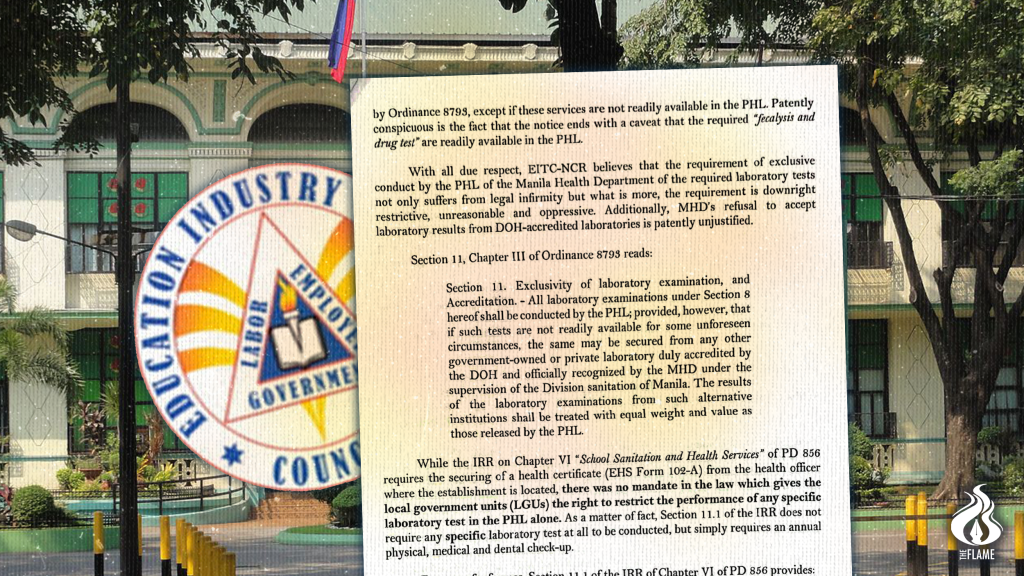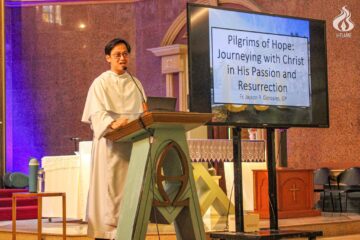
A MANILA-BASED education group has slammed the city government’s health permit policy for its compulsory and exclusive conduct of laboratory tests at the Manila Health Department (MHD), calling it “downright restrictive,” “unreasonable” and “oppressive.”
In a letter of protest addressed to Manila Mayor Honey Lacuna dated Aug. 14, the Education Industry Tripartite Council-National Capital Region (EITC-NCR) accused the city government of using “excess power” in implementing the policy.
“[T]he requirement of exclusive conduct by the [public health laboratory] of the Manila Health Department of the required laboratory tests not only suffers from legal infirmity but what is more, the requirement is downright restrictive, unreasonable and oppressive,” the letter read.
“Additionally, MHD’s refusal to accept laboratory results from DOH (Department of Health)-accredited laboratories is patently unjustified.”
City Ordinance 8793, or the Sanitation and Disinfection Code of Manila issued in 2021 requires employees to submit stool and urine samples and to undergo chest x-ray and drug test exclusively at the public health laboratory of the Manila Health Department, which is led by Lacuna’s husband Arnold “Poks” Pangan.
Saying there is a lack of legal mandate which states that medical procedures should be done solely by the Manila public health laboratory, the EITC-NCR argued that there was legal weakness in the city ordinance because it is inconsistent with the implementing rules and regulations of Presidential Decree (PD) 856 or the Code on Sanitation of the Philippines.
Contrary to the city ordinance, section 11 of the decree’s implemented rules and regulations only require school personnel to undergo annual physical, medical and dental check-ups, the group said.
“There was no mandate in the law which gives the local government units (LGUs) the right to restrict the performance of any specific laboratory test in the [public health laboratory] alone,” it said.
“This position of the Manila-based schools even finds support in Section 49 Chapter XI of Ordinance 8793, referring to the Health and Sanitation Standards for Educational Institutions, when it provides, ‘xxx The MHD shall conduct the examination for the public sector while the private sector may designate the medical institution of their choice.’”
Some groups have described the policy as a form of extortion intended to “milk” workers, while others have raised concerns over the “below average conditions” of the designated facility where employees must accomplish the health permit requirements.
The education group argued that the ordinance cannot limit tests to the public health laboratory as the nationwide sanitation code instructs LGUs to “guide the local health officer in the enforcement of the rules and regulation.”
“It should be emphasized that while the City of Manila is empowered to issue local legislation to promote the health and safety of its constituents, it must do so in accordance with the law,” it said.
The group called the act “ultra vires” or an act done beyond legal authority as it provided additional requirements than those already provided under national law.
EITC-NCR also urged the city government to review its compulsory drug testing as Republic Act 9165 only mandates a random drug test for all employees in line with a company’s work rules and regulations.
The group likewise noted that academic institutions are already conducting annual medical activities for school personnel. Because of the health permit, some employees are forced to file a leave of absence to accomplish the medical procedure at the designated facility, it added.
The EITC-NCR said medical tests taken from laboratories recognized by DOH should suffice for compliance with the health permit’s requirements as section 11 of the ordinance considers it equal to tests released by the public health laboratory.
“The Manila-based member-schools of EITC-NCR prays that the appropriate health certificate be issued by the Manila Health Department upon presentation by the school personnel of proof of a medical examination by any DOH-accredited laboratory pursuant to PD 856, and the tests before the [public health laboratory] of the Manila Health Department should be made voluntary and optional to the employee,” it said.
The protest letter was signed by managements and unions from the University of Santo Tomas, Adamson University, De la Salle University, Far Eastern University, San Beda University, Lyceum of the Philippines, Emilio Aguinaldo College, Paco Catholic School, Perpetual Help College, Philippine Women’s University and the Metropolitan Medical Center College of Arts Science and Technology.
The Office of the Mayor has yet to respond to the group’s letter as of writing. F — with reports from Ma. Alyanna Selda



